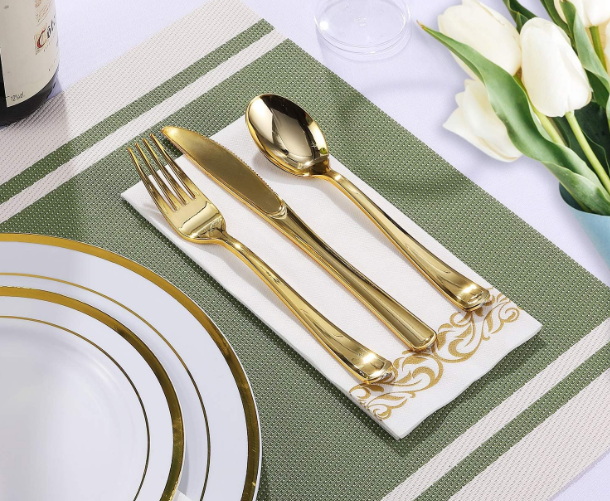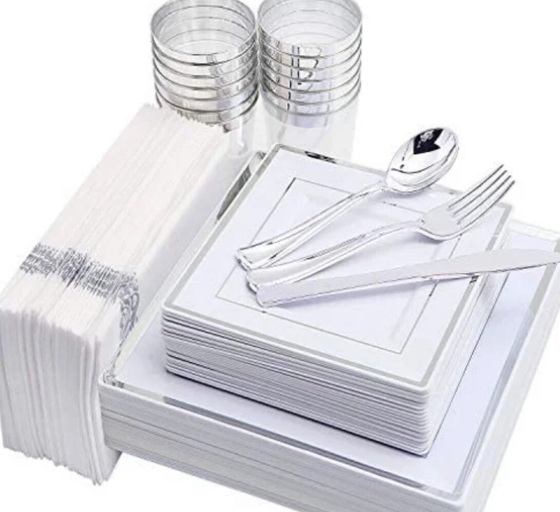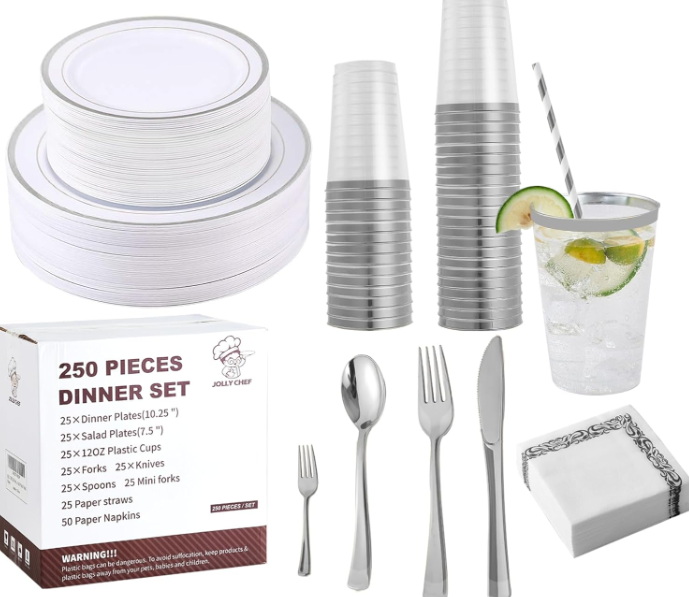
Content Menu
● Introduction to Disposable Utensils
>> S&R Disposable Spoons and Forks
● Safety Concerns with Plastic Utensils
>> Alternatives to Plastic Utensils
>> Benefits of Sustainable Utensils
● Choosing the Right Utensils for Kids
>> Tips for Using S&R Disposable Spoons and Forks Safely
● Educating Children About Utensil Safety
>> Involving Children in Sustainable Practices
● Conclusion
● FAQ
>> 1. Are S&R Disposable Spoons and Forks Safe for Kids?
>> 2. What Are the Risks of Using Plastic Utensils?
>> 3. What Are Some Safe Alternatives to Plastic Utensils?
>> 4. How Can I Ensure My Child Uses Utensils Safely?
>> 5. Are Biodegradable Utensils Effective and Safe?
● Citations:
When it comes to choosing utensils for children, safety and health are paramount. Disposable spoons and forks, such as those offered by S&R, are convenient options for many parents. However, the question remains: are these disposable utensils safe for kids? In this article, we will delve into the materials, safety concerns, and alternatives to help you make an informed decision.

Introduction to Disposable Utensils
Disposable utensils, including spoons and forks, are widely used due to their convenience and cost-effectiveness. They are often made from plastic, which raises concerns about their impact on health and the environment. The ease of use and disposability make them a staple at many events and gatherings, but it's crucial to consider the long-term effects.
S&R Disposable Spoons and Forks
S&R offers a range of disposable cutlery, including heavy-duty plastic spoons and forks. These are marketed as food contact safe and disposable, making them a popular choice for events and gatherings. However, despite their convenience, there are concerns about their safety for children.
Safety Concerns with Plastic Utensils
Plastic utensils, even if labeled as "food contact safe," can pose health risks. Here are some key concerns:
1. Chemical Leaching: Plastic can leach chemicals into food, especially when exposed to heat. This includes BPA and other harmful substances that can affect health. BPA, or bisphenol A, is known to mimic estrogen in the body, potentially leading to developmental issues in children.
2. Environmental Impact: Plastic is non-biodegradable, contributing to pollution and harming wildlife. The sheer volume of plastic waste, including disposable utensils, ends up in oceans and landfills, causing significant environmental damage.
3. Microplastics: Tiny plastic particles can enter the food chain, potentially causing health issues. Microplastics have been found in drinking water and food products, raising concerns about their impact on human health.
Alternatives to Plastic Utensils
Given the risks associated with plastic, many parents are turning to safer alternatives:
- Stainless Steel: Durable, non-toxic, and hygienic, stainless steel utensils are a popular choice for kids. They can be washed and reused multiple times, reducing waste and the risk of chemical exposure.
- Biodegradable Options: Made from materials like cornstarch or plant fibers, these utensils are eco-friendly and safer for children. They decompose naturally, reducing environmental pollution.
- Bamboo Utensils: Bamboo is a sustainable material that is both durable and biodegradable. Bamboo utensils are lightweight and easy to use, making them suitable for children.
Benefits of Sustainable Utensils
Choosing sustainable utensils offers several benefits:
- Health Safety: Reduces exposure to harmful chemicals like BPA.
- Environmental Protection: Minimizes plastic waste and pollution.
- Cost-Effective: While initially more expensive, sustainable options can be reused, making them cost-effective in the long run.

Choosing the Right Utensils for Kids
When selecting utensils for children, consider the following factors:
- Material Safety: Opt for materials that are non-toxic and free from harmful chemicals.
- Durability: Choose utensils that are durable and less likely to break or chip.
- Ergonomic Design: Ensure the utensils are designed for small hands and easy to use. Ergonomic designs help children learn to use utensils more effectively and reduce the risk of accidents.
Tips for Using S&R Disposable Spoons and Forks Safely
If you still prefer to use S&R disposable spoons and forks, follow these guidelines:
- Proper Disposal: Always dispose of them properly to avoid environmental harm. Ensure they are placed in recycling bins if possible.
- Avoid Reuse: Do not reuse disposable utensils to prevent bacterial growth and potential health risks.
- Supervise Children: Ensure children use them safely under adult supervision to prevent choking hazards or other accidents.
Educating Children About Utensil Safety
Educating children about the importance of utensil safety is crucial. Here are some tips:
- Explain the Risks: Teach children about the environmental and health risks associated with plastic utensils.
- Promote Sustainable Choices: Encourage children to choose sustainable options and explain why they are better.
- Practice Proper Use: Demonstrate how to use utensils safely and correctly.
Involving Children in Sustainable Practices
Involving children in sustainable practices helps them develop good habits early on:
- Encourage Participation: Let children help with choosing sustainable utensils or disposing of waste properly.
- Make It Fun: Turn sustainable practices into games or challenges to engage children.
- Lead by Example: Show children that sustainable living is important by practicing it yourself.
Conclusion
While S&R disposable spoons and forks may be convenient, they pose health and environmental risks. For the safety and well-being of children, consider switching to safer alternatives like stainless steel or biodegradable utensils. By choosing sustainable options and educating children about their importance, we can create a healthier and more environmentally conscious future.

FAQ
1. Are S&R Disposable Spoons and Forks Safe for Kids?
S&R disposable spoons and forks, while marketed as food contact safe, may still pose health risks due to chemical leaching and environmental concerns. It is safer to opt for non-plastic alternatives.
2. What Are the Risks of Using Plastic Utensils?
Plastic utensils can leach harmful chemicals into food, contribute to environmental pollution, and introduce microplastics into the food chain.
3. What Are Some Safe Alternatives to Plastic Utensils?
Safe alternatives include stainless steel and biodegradable utensils made from materials like cornstarch or plant fibers.
4. How Can I Ensure My Child Uses Utensils Safely?
Ensure children use utensils under adult supervision, especially when transitioning to new types of utensils. Choose ergonomic designs that are easy for small hands to handle.
5. Are Biodegradable Utensils Effective and Safe?
Biodegradable utensils are both effective and safe. They are made from natural materials, are non-toxic, and decompose quickly without harming the environment.
Citations:
[1] https://timesofindia.indiatimes.com/life-style/parenting/toddler-year-and-beyond/do-not-use-plastic-cutlery-for-your-kids-heres-why/articleshow/77524342.cms
[2] https://www.homesneaks.com/blogs/informational/choosing-stainless-steel-cutlery-for-toddlers-and-children-a-guide-for-parents
[3] https://www.ewg.org/news-insights/news/2024/12/your-black-plastic-spatula-serving-toxic-chemicals
[4] https://www.snrshopping.com/product/members-value-heavy-duty-spoon-and-fork-100pcs
[5] https://www.snrshopping.com/category/disposables-1
[6] https://www.easyngreen.com/eight-common-questions-about-ecofriendly-disposable-utensils.html
[7] https://www.snrshopping.com/product/members-value-heavy-duty-plastic-cutlery-1-box?rating_filter=2
[8] https://www.snrshopping.com/product/starch-ware-biodegradable-spoon-50pcs
[9] https://www.cpsc.gov/Recalls/2010/childrens-fork-and-spoon-sets-recalled-by-peachtree-playthings-due-to-choking-hazard
[10] https://pickaroo.com/sr/products/sr-lipa
[11] https://ar.shein.com/2pcs-Stainless-Steel-Baby-Spoon-And-Fork-Set-With-Storage-Box-Outdoor-Portable-Kids-Dinnerware-Kit-p-30365754-cat-4883.html
[12] https://www.anchenggy.com/blog/is-it-safe-to-reuse-disposable-utensils.html
[13] https://www.scmp.com/news/hong-kong/health-environment/article/3260365/hong-kongs-single-use-plastics-ban-suppliers-eco-friendly-tableware-urge-patience-amid-concerns-over
[14] https://www.lazada.com.ph/tag/disposable-spoon-and-fork-set-s&r/
[15] https://sr.dfiretailgroup.com/2023/assets/Full-Report.pdf

















